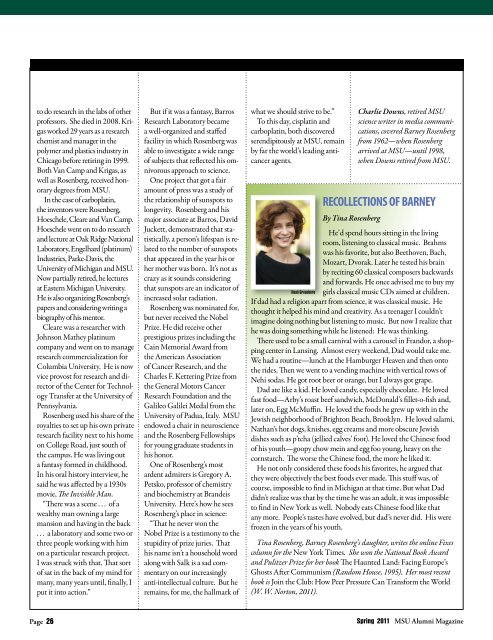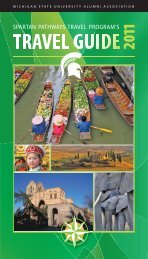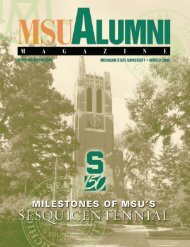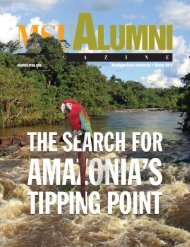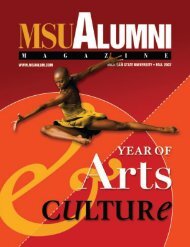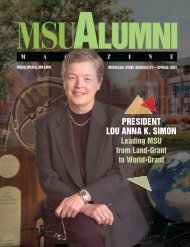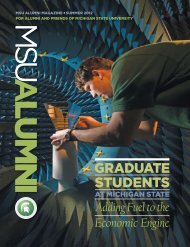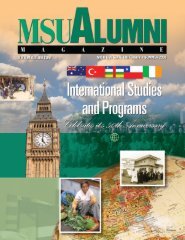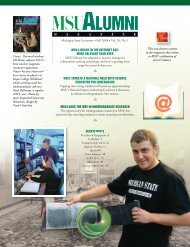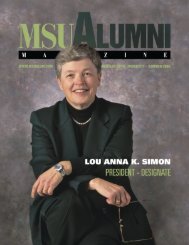Download - MSU Alumni Association - Michigan State University
Download - MSU Alumni Association - Michigan State University
Download - MSU Alumni Association - Michigan State University
You also want an ePaper? Increase the reach of your titles
YUMPU automatically turns print PDFs into web optimized ePapers that Google loves.
to do research in the labs of other<br />
professors. She died in 2008. Krigas<br />
worked 29 years as a research<br />
chemist and manager in the<br />
polymer and plastics industry in<br />
Chicago before retiring in 1999.<br />
Both Van Camp and Krigas, as<br />
well as Rosenberg, received honorary<br />
degrees from <strong>MSU</strong>.<br />
In the case of carboplatin,<br />
the inventors were Rosenberg,<br />
Hoeschele, Cleare and Van Camp.<br />
Hoeschele went on to do research<br />
and lecture at Oak Ridge National<br />
Laboratory, Engelhard (platinum)<br />
Industries, Parke-Davis, the<br />
<strong>University</strong> of <strong>Michigan</strong> and <strong>MSU</strong>.<br />
Now partially retired, he lectures<br />
at Eastern <strong>Michigan</strong> <strong>University</strong>.<br />
He is also organizing Rosenberg’s<br />
papers and considering writing a<br />
biography of his mentor.<br />
Cleare was a researcher with<br />
Johnson Mathey platinum<br />
company and went on to manage<br />
research commercialization for<br />
Columbia <strong>University</strong>. He is now<br />
vice provost for research and director<br />
of the Center for Technology<br />
Transfer at the <strong>University</strong> of<br />
Pennsylvania.<br />
Rosenberg used his share of the<br />
royalties to set up his own private<br />
research facility next to his home<br />
on College Road, just south of<br />
the campus. He was living out<br />
a fantasy formed in childhood.<br />
In his oral history interview, he<br />
said he was affected by a 1930s<br />
movie, The Invisible Man.<br />
“There was a scene . . . of a<br />
wealthy man owning a large<br />
mansion and having in the back<br />
. . . a laboratory and some two or<br />
three people working with him<br />
on a particular research project.<br />
I was struck with that. That sort<br />
of sat in the back of my mind for<br />
many, many years until, finally, I<br />
put it into action.”<br />
But if it was a fantasy, Barros<br />
Research Laboratory became<br />
a well-organized and staffed<br />
facility in which Rosenberg was<br />
able to investigate a wide range<br />
of subjects that reflected his omnivorous<br />
approach to science.<br />
One project that got a fair<br />
amount of press was a study of<br />
the relationship of sunspots to<br />
longevity. Rosenberg and his<br />
major associate at Barros, David<br />
Juckett, demonstrated that statistically,<br />
a person’s lifespan is related<br />
to the number of sunspots<br />
that appeared in the year his or<br />
her mother was born. It’s not as<br />
crazy as it sounds considering<br />
that sunspots are an indicator of<br />
increased solar radiation.<br />
Rosenberg was nominated for,<br />
but never received the Nobel<br />
Prize. He did receive other<br />
prestigious prizes including the<br />
Cain Memorial Award from<br />
the American <strong>Association</strong><br />
of Cancer Research, and the<br />
Charles F. Kettering Prize from<br />
the General Motors Cancer<br />
Research Foundation and the<br />
Galileo Galilei Medal from the<br />
<strong>University</strong> of Padua, Italy. <strong>MSU</strong><br />
endowed a chair in neuroscience<br />
and the Rosenberg Fellowships<br />
for young graduate students in<br />
his honor.<br />
One of Rosenberg’s most<br />
ardent admirers is Gregory A.<br />
Petsko, professor of chemistry<br />
and biochemistry at Brandeis<br />
<strong>University</strong>. Here’s how he sees<br />
Rosenberg’s place in science:<br />
“That he never won the<br />
Nobel Prize is a testimony to the<br />
stupidity of prize juries. That<br />
his name isn’t a household word<br />
along with Salk is a sad commentary<br />
on our increasingly<br />
anti-intellectual culture. But he<br />
remains, for me, the hallmark of<br />
what we should strive to be.”<br />
To this day, cisplatin and<br />
carboplatin, both discovered<br />
serendipitously at <strong>MSU</strong>, remain<br />
by far the world’s leading anticancer<br />
agents.<br />
Charlie Downs, retired <strong>MSU</strong><br />
science writer in media communications,<br />
covered Barney Rosenberg<br />
from 1962—when Rosenberg<br />
arrived at <strong>MSU</strong>—until 1998,<br />
when Downs retired from <strong>MSU</strong>.<br />
RECOLLECTIONS OF BARNEY<br />
By Tina Rosenberg<br />
He’d spend hours sitting in the living<br />
room, listening to classical music. Brahms<br />
was his favorite, but also Beethoven, Bach,<br />
Mozart, Dvorak. Later he tested his brain<br />
by reciting 60 classical composers backwards<br />
and forwards. He once advised me to buy my<br />
Noah Greenberg<br />
girls classical music CDs aimed at children.<br />
If dad had a religion apart from science, it was classical music. He<br />
thought it helped his mind and creativity. As a teenager I couldn’t<br />
imagine doing nothing but listening to music. But now I realize that<br />
he was doing something while he listened: He was thinking.<br />
There used to be a small carnival with a carousel in Frandor, a shopping<br />
center in Lansing. Almost every weekend, Dad would take me.<br />
We had a routine—lunch at the Hamburger Heaven and then onto<br />
the rides. Then we went to a vending machine with vertical rows of<br />
Nehi sodas. He got root beer or orange, but I always got grape.<br />
Dad ate like a kid. He loved candy, especially chocolate. He loved<br />
fast food—Arby’s roast beef sandwich, McDonald’s fillet-o-fish and,<br />
later on, Egg McMuffin. He loved the foods he grew up with in the<br />
Jewish neighborhood of Brighton Beach, Brooklyn. He loved salami,<br />
Nathan’s hot dogs, knishes, egg creams and more obscure Jewish<br />
dishes such as p’tcha (jellied calves’ foot). He loved the Chinese food<br />
of his youth—goopy chow mein and egg foo young, heavy on the<br />
cornstarch. The worse the Chinese food, the more he liked it.<br />
He not only considered these foods his favorites, he argued that<br />
they were objectively the best foods ever made. This stuff was, of<br />
course, impossible to find in <strong>Michigan</strong> at that time. But what Dad<br />
didn’t realize was that by the time he was an adult, it was impossible<br />
to find in New York as well. Nobody eats Chinese food like that<br />
any more. People’s tastes have evolved, but dad’s never did. His were<br />
frozen in the years of his youth.<br />
Tina Rosenberg, Barney Rosenberg’s daughter, writes the online Fixes<br />
column for the New York Times. She won the National Book Award<br />
and Pulitzer Prize for her book The Haunted Land: Facing Europe’s<br />
Ghosts After Communism (Random House, 1995). Her most recent<br />
book is Join the Club: How Peer Pressure Can Transform the World<br />
(W. W. Norton, 2011).<br />
Page 26<br />
Spring 2011 <strong>MSU</strong> <strong>Alumni</strong> Magazine


